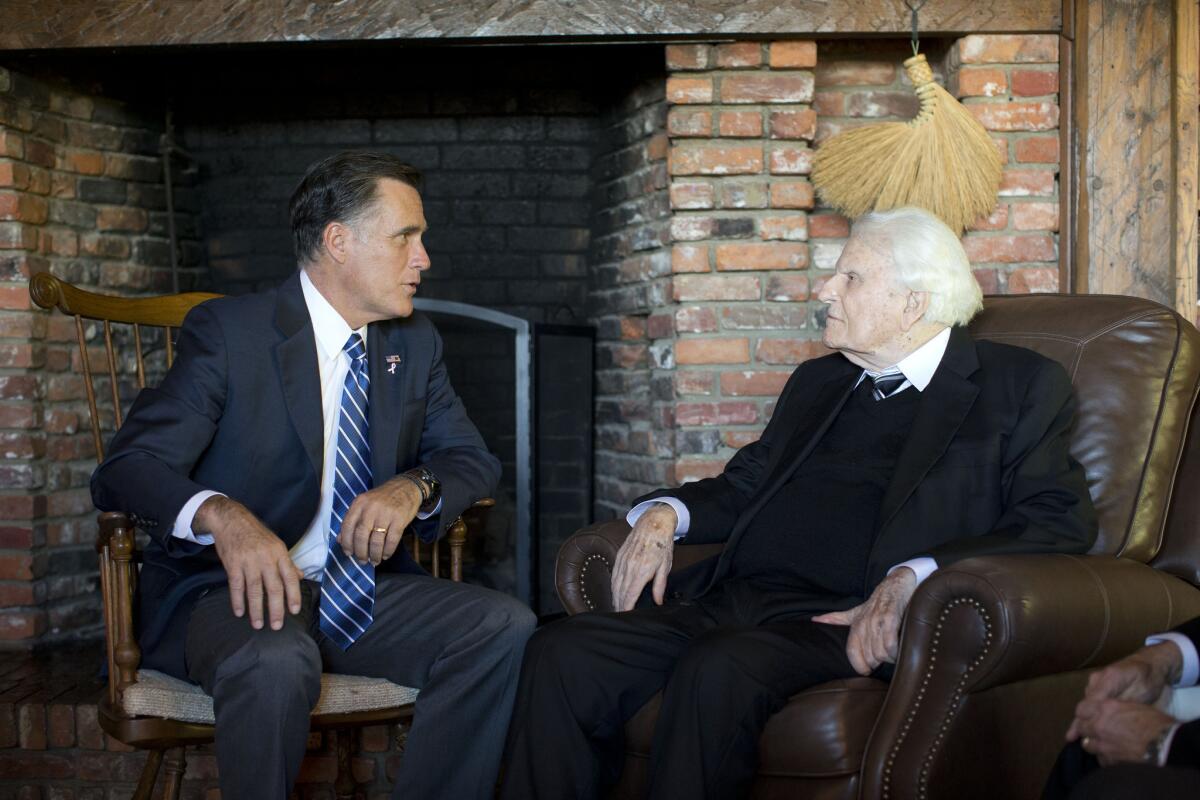Keeping politics out of the pulpit

- Share via
The Internal Revenue Service advises churches and other tax-exempt organizations that, under federal law, they are “absolutely prohibited from directly or indirectly participating in, or intervening in, any political campaign on behalf of (or in opposition to) any candidate for elective public office.” But the 2012 election campaign that mercifully is coming to a close demonstrates that some religious leaders, while they may be abiding by the letter of the law, are willing to undermine its spirit. To wit:
•A week after Mitt Romney visited the venerable evangelist Billy Graham, the Billy Graham Evangelistic Assn. removed Mormonism from its list of religious cults. Graham’s son, Franklin, also an evangelist, wrote an article titled “Can an Evangelical Christian Vote for a Mormon?” The answer: Yes. (According to the New Yokr Times, Franklin Graham said the “cult” reference was mistakenly made by a staff member.)
•In Peoria, Ill., Roman Catholic Bishop Daniel Jenky ordered priests in his diocese to read a letter to parishioners the Sunday before the election criticizing “the president” for including contraception in his health insurance mandate. Jenky then warned that “Catholic politicians, bureaucrats, and their electoral supporters who callously enable the destruction of innocent human life in the womb also thereby reject Jesus as their Lord.” He ended with this appeal: “I therefore call upon every practicing Catholic in this diocese to vote. Be faithful to Christ and to your Catholic faith.”
•Bishop Thomas Paprocki of Springfield, Ill., suggested that hellfire awaited Catholics who voted the wrong way. “I am not telling you which party or which candidates to vote for or against,” he wrote in the diocesan newspaper. “But I am saying that you need to think and pray very carefully about your vote, because a vote for a candidate who promotes actions or behaviors that are intrinsically evil ... makes you morally complicit and places the eternal salvation of your own soul in serious jeopardy.” Paprocki’s “evils”: same-sex marriage and abortion.
Some religious leaders are willing to challenge the prohibition of political activity directly. In New York City earlier this year, a priest inserted in a church bulletin an article by several former U.S. ambassadors to the Vatican calling on Catholics to vote for Romney. And last month, dozens of churches participated in the fifth “Pulpit Freedom Sunday” sponsored by the conservative group Alliance Defending Freedom. Participants were invited to preach about “what Scripture says about the selection of our national, state, or local leaders.” Some preachers sent their sermons to the IRS, essentially daring the agency to investigate them. The alliance boasts that none of those pastors has been punished or censored by the IRS.
Some would argue that it’s futile for the IRS to try to police political activity by churches. We disagree. The IRS can and should investigate accusations of blatant partisanship, such as a church bulletin that endorses a candidate by name or the sign outside a Texas church that reportedly advised: “Vote for the Mormon, not the Muslim! The capitalist, not the communist!”
Yet it’s also true that much advocacy by churches will not be explicit enough to justify legal reprisals. That was the case, for example, with the prolonged and inconclusive IRS investigation of an antiwar sermon preached in 2004 at All Saints Episcopal Church in Pasadena. The retired rector had described a scenario in which Jesus participated in a debate with George W. Bush and John F. Kerry. He didn’t endorse either candidate but said that Jesus would have told Bush that his war strategy in Iraq “has led to disaster.”
One consolation for those offended by heavy-handed election-year sermonizing is that, even in the traditionally hierarchical Catholic Church, religious leaders don’t always have the last word. For example, Bishop Paprocki’s warning prompted rebuttals from politically liberal Catholics who noted that the late Pope John Paul II had applied the term “intrinsically evil” also to “subhuman living conditions, arbitrary imprisonment, deportation, slavery, prostitution and trafficking in women and children; [and] degrading conditions of work which treat laborers as mere instruments of profit, and not as free responsible persons.”
Believers understandably pay attention to their religious leaders. But in the end they are likely to think, and vote, for themselves.
More to Read
A cure for the common opinion
Get thought-provoking perspectives with our weekly newsletter.
You may occasionally receive promotional content from the Los Angeles Times.






